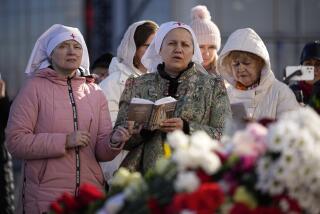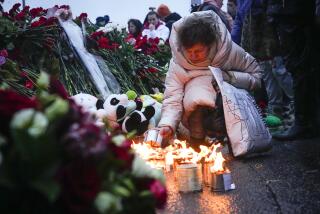Slaying Prompts Call for 1-Day Russian Bankers Strike : Crime: Today’s shutdown aims to prod authorities to crack down on violence against financial institutions.
- Share via
MOSCOW — Shocked by the slaying of one of the country’s premier bankers, hundreds of Russia’s fledgling banks planned to close their doors in protest today, saying they were desperate enough to sacrifice a day’s business to underscore the deadly threat they face from organized crime.
“It is as if the head of Citibank were murdered,” said Pyotr Aven, formerly Russia’s foreign trade minister and now president of the commercial Alfa Bank. “The government has shown itself absolutely incapable of providing security for bankers.”
He was reacting to the killing last Thursday of Nikolai P. Likhachev, chairman of the gigantic Rosselkhozbank.
“Our very survival is at stake,” said Igor Dergunov, a spokesman for Mostbank, another commercial bank. “And no one should deceive themselves about this. If the criminal (organizations) kill another 10 bankers, they could really force the banks to dance to their tune. All that would definitely nip in the bud any plans for financial stabilization of the country.”
According to the newspaper Izvestia, more than 30 Russian bankers, many of them quite prominent, have been killed in the last year.
The Assn. of Russian Banks sent a furious appeal Monday to President Boris N. Yeltsin, complaining of “unceasing terror unleashed by mafia groups against the heads of Russia’s major financial and industrial institutions.”
It accused Russian police and the Security Ministry of standing by passively as hit men have picked off business leaders and bank chairmen, and demanded that top law enforcement officials be replaced.
News of these killings has become commonplace in Moscow, but Likhachev’s slaying moved what had appeared to be the low-level settling of scores up into the realm of high finance and Kremlin-level politics.
“Russian business suffered the greatest loss in all its existence on Dec. 2,” the prestigious Nezavisimaya Gazeta, or Independent Newspaper, wrote. It calculated that Likhachev, who controlled the main channel for loans to farmers as head of Russia’s second-biggest bank, could be considered one of the 10 most influential people in the country.
Likhachev, in his mid-fifties, was a 35-year veteran of Russian banking, colleagues said. He had served as deputy chairman of the Russian Central Bank during the Soviet period and again more recently. His bank, Rosselkhozbank, was created out of the former state-owned giant that serviced all of Soviet agriculture and continues to funnel 80% of government farm credits.
Likhachev arrived home from work on Thursday at about 7 p.m., walked into the entryway of his apartment building and was killed there with two bullets to the head. The killer apparently used a silencer because neighbors heard no shots and the body was found an hour or so later.
Police were said to be fairly certain that the killer was a professional but to lack even a working hypothesis as to the motive. Izvestia commented that the killing probably had to do with attempts by organized crime to get hold of cheap government loans, which, “to put it lightly, is not up the alley of a run-of-the-mill detective.”
The Assn. of Russian Banks, which claims some 700 members from among Russia’s estimated 2,000 commercial banks, said it expected most of its members to join today in what was being billed as a one-day bankers strike and day of mourning timed to coincide with Likhachev’s funeral.
The main foreign currency exchanges in Moscow, St. Petersburg and Novosibirsk also planned to cancel trading for the day.
Yeltsin has met with Russia’s top bankers--including Likhachev--at least twice and promised them improved law and order, but bankers complain that he failed to follow up with any action. Top bankers tend to have bodyguards--although Likhachev apparently traveled without one--and are talking of setting up a private police force.
Although most of the attacks on bankers stem from financial conflicts, Aven of Alfa Bank argued that the killing of Likhachev and other bankers should be seen in the context of Russian politics, of the continuing war between reformists and hard-liners.
“One of the versions (of Likhachev’s death) is a pure and simple attack on new Russian business, including the banking sector,” he said.
Russia’s commercial banks, although springing up by the hundreds around Moscow and elsewhere, remain wobbly and vulnerable. The oldest of them is only 5 years old, said Alexander Zaryadsky, a spokesman for the Assn. of Russian Banks. And Russia’s inflation is so high and its economy so unstable that they do almost all of their work in short-term, high-interest loans.
Zaryadsky estimated that commercial banks are already doing hundreds of millions of dollars worth of business. Many bank chairmen are among the richest of the Russian nouveaux riches.
More to Read
Sign up for Essential California
The most important California stories and recommendations in your inbox every morning.
You may occasionally receive promotional content from the Los Angeles Times.













